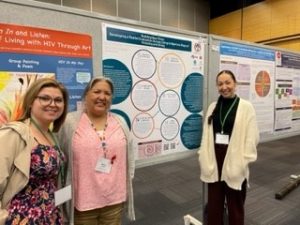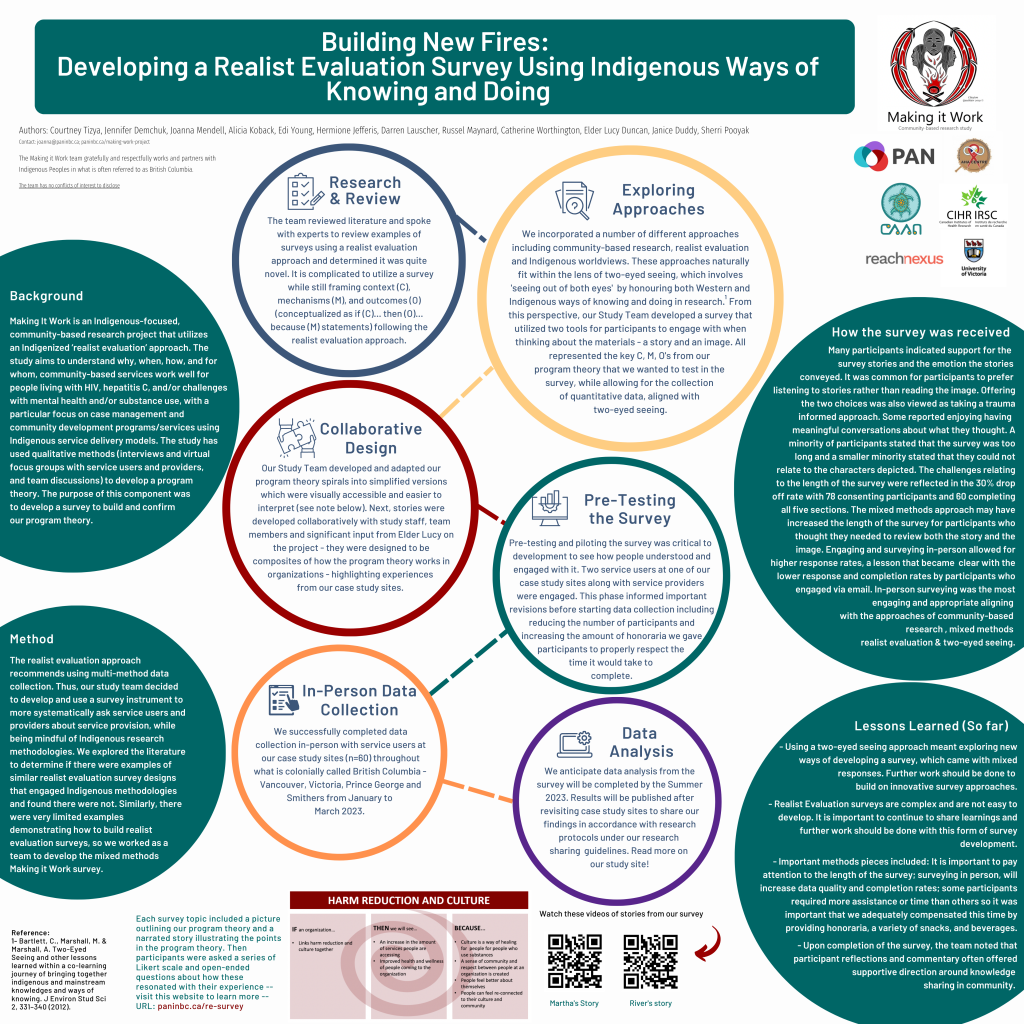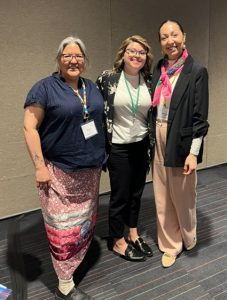
Jennifer Demchuk (PAN), Sherri Pooyak (AHA Centre; CAAN), Courtney Tizya (PAN)
The 32nd Annual Canadian Conference on HIV/AIDS Research (CAHR) was held in person in Quebec City April 27th – 30th, 2023. The annual CAHR conference is the premier gathering in Canada for those working in the field of HIV, as well as policy makers, persons living with HIV and other individuals committed to ending the pandemic. This year’s conference welcomed over 670 participants from across the country with a theme, “A Boomerang Effect: From HIV to SARS-CoV2 and Back again.”
The conference featured a very wide range of speakers and presentations throughout the five days of conference-related events, including over 300 abstracts shared via poster and oral presentations. Community involvement plays a vital role at the annual CAHR conference, and it was great to see there were over 75 community registration scholarships and 8 community travel awards.
Two members of PAN’s Research and Evaluation team were able to attend the conference and share with other conference attendees in a poster presentation for the Making it Work project and ancillary event focused on our Sharing Space, Community of Practice: Doing research in a good way with Indigenous people living with HIV.
Making it Work Poster Presentation; Building New Fires: Developing a Realist Evaluation Survey Using Indigenous Ways of Knowing and Doing
Click image to view in larger format.

Making It Work is an Indigenous-focused, community-based research project in BC co-led by PAN and the AHA Centre at CAAN (Communities, Alliances and Networks) that was born out of conversations within the community when looking at the challenges people living with HIV, hepatitis C and other associated—and complex—social and health issues face every day. Making it work utilizes an Indigenized ‘realist evaluation’ approach and aims to understand why, when, how, and for whom community-based services work well for people living with HIV, hepatitis C, and/or challenges with mental health and/or substance use. MIW has a special focus on case management and community development programs or services using Indigenous service delivery models. The study has used qualitative methods (interviews and virtual focus groups with service users and providers, and team discussions) to develop a program theory. The purpose of this component was to develop a survey to build and confirm our program theory.
Rooted in an Indigenized ‘realist evaluation’ approach that recommends using multi-method data collection, the MIW study team decided to develop and use a survey instrument to more systematically ask service users and providers about service provision, while being mindful of Indigenous research methodologies.
We explored available literature to determine if there were examples of similar realist evaluation survey design that engaged Indigenous methodologies, and recognized quickly that we were working in new methodological territory. Our team discussed what needed to be included in the survey in relation to our program theory, drawing upon Indigenous ways of knowing. Through drafts, discussions of competing methods concern, and pre-testing among team members, the final online survey tool included narrated stories and images for participants to reflect on. Two of the narrated stories can be accessed through the QR codes located on the poster.
The team looks forward to sharing survey results through a series of community events throughout BC later this summer.
Ancillary Event; Sharing Space, Community of Practice: Doing research in good way with Indigenous people living with HIV
Prior to the official opening of the conference, Jennifer Demchuk (PAN Research and Evaluation Manager), Courtney Tizya (Making it Work Research Trainee), and Sherri Pooyak (AHA Centre; CAAN), hosted an ancillary event together to share, learn from, and collaborate on doing research with Indigenous people “in a good way”.
 We developed the concept for this session based on the Sharing Space: Indigenous Research Community of Practice, a partnership of the AHA Centre and PAN /REACH, which was started during COVID meeting limitations. There are many amazing community-based research studies being conducted by or with Indigenous Peoples across our lands, and it can be challenging for research teams to figure out wise practices for conducting research at the best of times. This was even more so during a pandemic where keeping distant was the best way to care for one another. While this community of practice was originally started at the beginning of the COVID-19 pandemic, the challenges we’ve explored remain relevant and we want to keep providing a space to discuss important research together. The ancillary event at CAHR was an extension of our circle of discussions.
We developed the concept for this session based on the Sharing Space: Indigenous Research Community of Practice, a partnership of the AHA Centre and PAN /REACH, which was started during COVID meeting limitations. There are many amazing community-based research studies being conducted by or with Indigenous Peoples across our lands, and it can be challenging for research teams to figure out wise practices for conducting research at the best of times. This was even more so during a pandemic where keeping distant was the best way to care for one another. While this community of practice was originally started at the beginning of the COVID-19 pandemic, the challenges we’ve explored remain relevant and we want to keep providing a space to discuss important research together. The ancillary event at CAHR was an extension of our circle of discussions.
The event began with presentations from the AHA Centre and from PAN/REACH Nexus that focused on what has worked well, and what has been difficult in various research projects. The presentations were followed by a rich discussion with event attendees to ask questions and talk with others in the room about their current and upcoming research.
 Attendees represented a range of experience for those engaged in Indigenous research, including students, community organization members, researchers, and many others. The room was open to all conversations including researchers striving to set their work up in a good way, the scope of the First Nations Principles of OCAP, team’s experiences Indigenizing research, and the reminder that all research teams should be considering the importance of documenting and publishing their learnings during their process. One session attendee noted that the Sharing Space, Community of Practice: Doing research in good way with Indigenous people living with HIV ancillary event should have been included in the main agenda for all conference attendees.
Attendees represented a range of experience for those engaged in Indigenous research, including students, community organization members, researchers, and many others. The room was open to all conversations including researchers striving to set their work up in a good way, the scope of the First Nations Principles of OCAP, team’s experiences Indigenizing research, and the reminder that all research teams should be considering the importance of documenting and publishing their learnings during their process. One session attendee noted that the Sharing Space, Community of Practice: Doing research in good way with Indigenous people living with HIV ancillary event should have been included in the main agenda for all conference attendees.
The event resulted in very fruitful discussion that rolled into the following days of the conference and engrained the understanding that having a space to share the experiences of Indigenizing research is still very beneficial to research teams across the country.
Questions? Contact Jennifer Demchuk, Research and Evaluation Manager: jennifer [at] paninbc.ca
